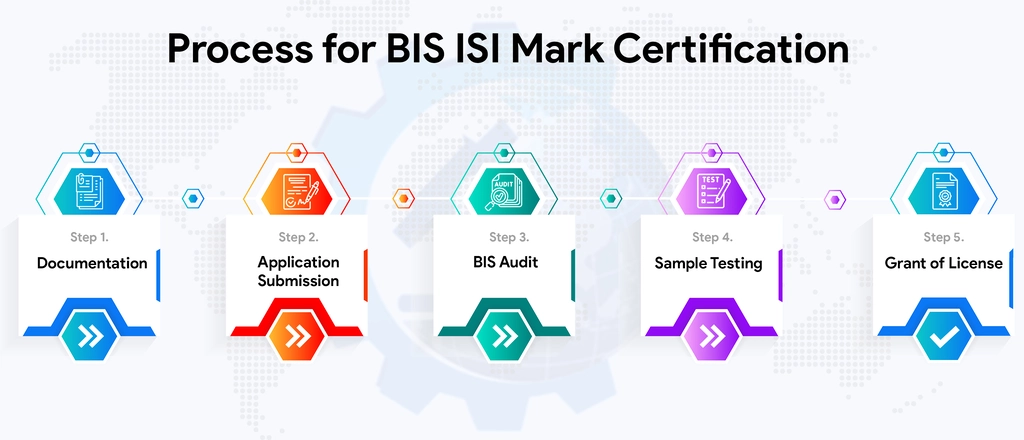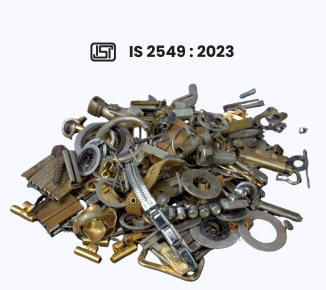BIS CERTIFICATION PROCESS INFORMATION for Processed Ferrous Scrap — Code for Classification IS 2549
Introduction
Processed ferrous scrap is a very important feedstock material in the metal recycling and steel-producing industries. It covers iron and steel scrap processed to be classified to meet the requirements for various uses, the main one being steelmaking. IS 2549:2023 describes the code relating to classification for processed ferrous scrap. Acquiring certification through BIS under this standard for products will ensure the quality and safety parameters of the product, thereby guaranteeing value in the market and, more importantly, consolidating sustainable industrial practices.
BIS certification for processed ferrous scrap is necessary to ensure that the classification and processing of the scrap meet the required quality, safety, and environmental standards. Certification guarantees that the scrap is processed in a way that is safe for use in industrial applications, supporting efficient manufacturing processes and high-quality steel production.
The market for processed ferrous scrap is robust, driven by the growing steel industry, which is heavily reliant on recycled materials. India’s focus on sustainable manufacturing and circular economy initiatives is further boosting the demand for high-quality, classified scrap, making BIS certification an important factor for market competitiveness. Processed ferrous scrap is mainly used in:
- Steel manufacturing plants.
- Foundries and metal casting industries.
- Automotive and construction industries for the production of various steel products.
- Exports to international markets seeking high-quality recycled steel.
Overview of IS 2549:2023
IS 2549:2023 Indian Standard Classification Code for Processed Ferrous Scrap The present standard specifies the classification of scrap into various grades depending on material composition, level of contamination, and physical properties. The endeavor should be to assure the consistency in scrap quality being used to achieve better efficiency and quality of output in industries such as steel making.
Key Aspects of IS 2549:2023
- Classification of Scrap: The standard details the classification of ferrous scrap into different categories based on quality, contamination levels, and usability.
- Quality and Composition Standards: IS 2549:2023 outlines the requirements for the chemical composition and physical properties of the scrap, ensuring it meets the criteria for specific industrial applications.
- Environmental and Safety Considerations: The standard emphasizes environmentally friendly processing and handling practices, ensuring that certified scrap meets safety and sustainability requirements.
- Testing and Verification: The BIS certification process involves thorough testing and verification of scrap classification, ensuring compliance with the prescribed standards.
Key highlights
| Product Name | Processed Ferrous Scrap |
| Applicable Indian Standard | IS 2549:2023 |
| Applicable Certification Scheme | Product Certification Scheme (ISI Mark Scheme) Scheme 1 |
| Applicable Mark: | BIS Standard Mark (ISI Logo) |
| Compliance Requirement | Mandatory |
| Quality Control Order | Click here |
| Ministry | Ministry of Steel |
| Scope as per Standard | Ferrous scrap types include Prompt (from processing), Obsolete (post-use), and Home Scrap (marketable). The standard covers cast iron, tool steel, alloy steel, and stainless steel, but excludes internal wastes like slags, dust, and spent liquor, as well as internally consumed Home Scrap. |
Applicable Tests
- Cleanliness
- Residuals
- Non-Metallic Residuals
- Safety And Radioactivity
- Classification Of Scrap Based On Source Of Generation
- Classification Of Scrap Based On Use
- Re melting Scrap
- Re rollable Ferrous Scrap
- Remanufacturing Scrap

Note
For Detailed Information about the Procedure for BIS ISI Certification, Visit :
Timeline for BIS Certification
The approximate timeline to obtain BIS certification for Processed Ferrous Scrap — Code for Classification to use the ISI mark as per IS 2549:2023 is as follows:
- For Indian Manufacturers (Standard Timeframe – 30 days)
- For Foreign Manufacturers (Standard Timeframe – 180 days)
Benefits of BIS Certification
BIS certification offers several significant benefits:
| Benefit | Description |
|---|---|
| Access to the Indian Market | BIS certification allows manufacturers and suppliers to legally sell processed ferrous scrap in India, complying with government regulations. |
| Compliance with Indian Standards | Certification ensures that processed ferrous scrap meets the quality, safety, and environmental standards outlined in IS 2549:2023. |
| Enhanced Product Credibility | BIS-certified scrap is recognized for its quality and reliability, making it the preferred choice for steel producers and other industries. |
| Increased Customer Trust | End-users and industries are more likely to purchase BIS-certified scrap, knowing it has undergone rigorous testing and classification. |
| Benefits for MSMEs | MSMEs can gain a competitive edge by offering BIS-certified products, expanding their market reach, and building customer confidence. |
Case Studies
The metal recycling company approached the market leader to obtain BIS certification under IS 2549:2023 for its processed ferrous scrap. The certification process required rigorous classification, quality standardization, and environmentally sound practices. This certificate, once obtained, brings in an outpouring of demand from manufacturers of steel and allied industries, since scrap materials, duly certified by BIS, are assured of quality conforming to standards. The success saga of the company depicts how BIS certification can unlock new business opportunities for sustainable growth in the metal recycling sector.
Conclusion
BIS certification of processed ferrous scrap to IS 2549:2023 is testimony to the importance of standardization within the recycling and metal industries. To any supplier or manufacturer, however, it is much more than just a way to meet regulatory requirements but a means of bringing confidence to markets, product quality, and assisting in sustainable industrial practices. The company stands to gain by getting its products aligned with the BIS standards in that such a product would be easily recognized for its reliability, safety, and care for the environment. This increases competitiveness in both domestic and international markets.
Aleph INDIA has been serving the industry as a single-window operator for all product regulatory compliance. We can assist importers or manufacturers in meeting all criteria for importing or selling a product in the Indian market.
Frequently Asked Questions
International Audits & Participation
Testimonials
BIS REGISTRATION FOR ELECTRONIC & IT PRODUCT
In the era of globalization, world trade is growing rapidly and henceforth, Manufacturing and Import/Export businesses are also growing drastically...View More
BIS CERTIFICATE FOR FOREIGN MANUFACTURER
The Economy of India-the fastest developing economy on the globe with the capabilities that help it matches up with the biggest international...View More
PRODUCT CERTIFICATION SCHEME (ISI MARK) FOR DOMESTIC MANUFACTURERS
Anything a person buys from food to cars, clothes to electronics, branded to unnamed products there is always a question that wanders in one’s...View More
WIRELESS PLANNING AND COORDINATION (WPC)
WPC: Wireless means communication done from one point to another point without the wires and cables. Electromagnetic waves carry the ...View More
BUREAU OF ENERGY EFFICIENCY (BEE) CERTIFICATE
BEE CERTIFICATE: Energy is the future, and its conservation is the way of the bright future. Everyone claims the environment is important...View More
E-WASTE MANAGEMENT
E-waste is one of the world's fastest-growing trash streams. We currently manufacture almost 50 million tones of it each year...View More
View All Services
Request a call back.
Would you like to speak to one of our Senior Technical advisers over the phone? Just submit your details and we’ll be in touch shortly. You can also email us if you would prefer.






























